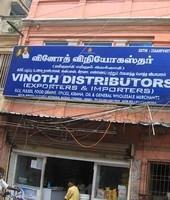Importers In Chennai
1
Prasanth Impex Private Limited
184,Building Golden Aneclave,P H Road Chenni,Nr Ega Theatreub Gr,Chennai-600010 2
E M Impex Private Limited
63,G - 6 Sir Usman Court,Chennai 3
Inko Impex Private Limited
Old,Chennai 4
A K Exporters
Old 8,Parrys,Chennai 5
J J Impex Delhi Private Limited
9 Sp,Guindy,Chennai 6
Industrial Chain Concern
197,Linghi Chetty Street,Parry's Corner,George Town, Chennai-600001 7
Vinoth Distributors
No 176,Anna Pillai Street,Kothawal Bazzar, Chennai-600001 8
Alim Exports
6,Silver Scheme Apartment,2nd Floor,Scheme Road,Nungambakkam,Chennai 9
Universal Marketers
Seshachalam St,Periyapet,Saidapet,Chennai-600015 10
Hamilton Fuel Corporation
16,Nainar Road,Mylapore,Chennai-600004 Frequently Asked Questions